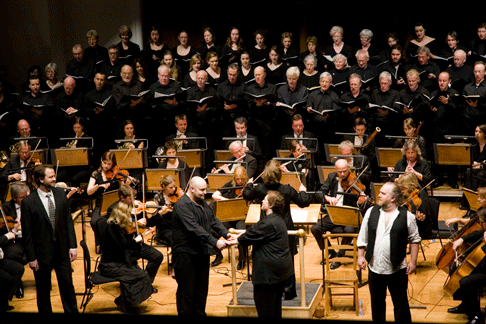08 Mar 2009
Fidelio — London Lyric Opera, Cadogan Hall
After a problematic debut last Autumn with Der fliegende Holländer at the Barbican, London’s newest opera-in-concert outfit returned this month with Fidelio at the smaller Cadogan Hall.

After a problematic debut last Autumn with Der fliegende Holländer at the Barbican, London’s newest opera-in-concert outfit returned this month with Fidelio at the smaller Cadogan Hall.
And what an improvement it was — the fundamental difference being that the most important roles were strongly cast. As Leonore, Elizabeth Connell wielded her steely-centred soprano with a confidence that was equal to the dramatic demands of the role without compromising on lyricism and good classical technique. Her physical characterisation was less convincing; her Fidelio was introverted, diffident and tentative until it came to the critical moment of the rescue. Leonore must surely have had to be convincing enough as a strapping youth to convince both Rocco and Marzelline of her credentials; here she never quite disguised the persona of the desperately worried wife.
The tenor Jeffrey Lloyd-Roberts sang Florestan; his voice is oversized in a small hall, but this only heightened the impact of his emotionally powerful performance. The commitment in his singing was second to none, even if it made his vocal delivery rather ragged around the edges. Without the benefit of a fully staged production, it was his performance which brought to life not only the character but the whole scenario.
The interplay between Rachel Nicholls’ Marzelline and Andrew Staples’ Jaquino drew affectionate laughter from the audience. Staples’ delivery is lucid and direct, while Nicholls soprano is perhaps overly rich and creamy for this role but a gorgeous, bright sound nonetheless.
Richard Wiegold, a young singer still, had the fatherly demeanour for Rocco and an attractively projected bass.
The weak point, I’m afraid, remained the baritone James Hancock (the company’s founder) as Pizarro. Although Beethoven gives him comparatively little to sing, thus limiting the impact of his performance on the concert, his blustering, characterless singing in imperfect German could not help but be shown up by the high-quality surrounding cast. Surely there is a major flaw in his strategy here?
 [Photo by Moz Bulbeck]
[Photo by Moz Bulbeck]
The young conductor Madeleine Lovell was polished and assured in her direction of the Royal Philharmonic Orchestra; the overture was robust and lyrical, the arias sensitively accompanied and the big dramatic climaxes powerfully realised. The collective vocal strength of the Philharmonia Chorus, galvanised by Cambridge’s Queen’s College Chapel Choir, gave them a pleasingly ‘operatic’ timbre so often missing from concert choirs.
It was certainly in a different league to that very disappointing Dutchman, better on almost every level.
Ruth Elleson © 2009